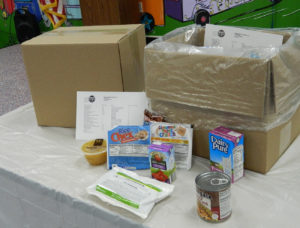WACO—The Baylor Collaborative on Hunger and Poverty has joined in a national effort with the U.S. Department of Agriculture, McLane Global and PepsiCo to deliver food boxes to students in a limited number of rural schools closed to help curb the spread of COVID-19.

The Baylor Collaborative on Hunger and Poverty, McLane Global and PepsiCo will begin distribution to the students next week and quickly will increase capacity to nearly one million nutritious meals per week.
In addition to distribution, PepsiCo will provide $1 million in funding to the Baylor Collaborative on Hunger and Poverty to support school districts and to identify the children most in need.
“We are grateful to come alongside USDA, PepsiCo and McLane Global to ensure that children impacted by school closures get access to nutritious food regardless of where they live,” said Jeremy Everett, executive director of the Baylor Collaborative on Hunger and Poverty.
“We know from firsthand experience that families with children who live in rural communities across the U.S. are often unable to access the existing food sites. Meal delivery is critical for children in rural America to have consistent access to food when school is out. This is one way that we—as citizens of this great nation—can respond to our neighbors in need.”
Provide food, limit exposure to COVID-19
The boxes will contain five days of shelf-stable, nutritious, individually packaged foods that meet USDA’s summer food requirements. The use of this innovative delivery system will ensure rural children receive nutritious food while limiting exposure to COVID-19. USDA will reimburse private sector partners for the same rate as a Summer Food Service Program site.
“School closings in response to COVID-19 mean that millions of students who depend on school meals may not have their nutritional needs met. And because nutritious food is essential for students to learn and grow, we’re working with Baylor to help fill this critical gap,” said Jon Banner, Executive Vice President, PepsiCo Global Communications and President, PepsiCo Foundation.
“Our $1 million contribution to Baylor will immediately help identify children most at risk, and then PepsiCo’s nutrition program Food for Good will provide at least 200,000 meals per week for them. It’s one way we will help nourish young people across the country and support their development in the midst of this crisis.”

USDA will utilize best practices learned through a summer pilot program in 2019 to deliver food boxes to children in rural America.
Sign up for our weekly edition and get all our headlines in your inbox on Thursdays
Baylor will coordinate with the appropriate state officials to prioritize students who do not currently have access to a SFSP site and have an active outbreak of COVID-19.
“McLane Global was proud to take part in the success of the summer Meals-2-You home delivery pilot program in 2019,” said Denton McLane, Chairman, McLane Global.
“It was a great opportunity to bring private industry best practices together with the USDA to combat rural hunger. Given the rapid disruptions driven by COVID-19, we can work together to swiftly take this model nationwide. McLane Global is ready to do its part to support the fight against hunger through this crisis.”
Initial capacity is limited, and additional vendors are requested and encouraged to ensure more food can be provided to more rural children as additional schools close. USDA has created a single contact for those who have suggestions, ideas or want to help feed kids across the country at [email protected].
USDA allows flexibility during school closures
Last week, U.S. Secretary of Agriculture Sonny Perdue announced proactive flexibilities to allow meal service during school closures to minimize potential exposure to the coronavirus. During an unexpected school closure, schools can leverage their participation in one of USDA’s summer meal programs to provide meals at no cost to students.
Under normal circumstances, those meals must be served in a group setting. However, in a public health emergency, the law allows USDA the authority to waive the group setting meal requirement, which is vital during a social distancing situation.
“Feeding children who are affected by school closures is a top priority for President Trump and this Administration. USDA is working with private sector partners to deliver boxes of food to children in rural America who are affected by school closures,” said Secretary Perdue.
“Right now, USDA and local providers are utilizing a range of innovative feeding programs to ensure children are practicing social distancing but are still receiving healthy and nutritious food. This whole of America approach to tackling the coronavirus leverages private sector ingenuity with the exact same federal financing as the Summer Food Service Program. USDA has already taken swift action to ensure children are fed in the event of school closures, and we continue to waive restrictions and expand flexibilities across our programs.”
Website lists school food resources
In a related development, to help families with children find food sites in their local communities, the Baylor University Collaborative on Hunger and Poverty has launched a website that provides a running list of school closures accompanied by the meals schools will have available.
The COVID-19 TX Food Resource website is available here. The spreadsheet can be found under the “School Food Resources” tab.
As new food sites are opened, the list will be updated by the Baylor Collaborative on Hunger and Poverty with information gathered by the Texas Hunger Initiative, Feeding Texas and Communities in Schools of Texas.
“We are working with state and local officials to ensure all children in Texas have ample food access during school closures due to COVID-19,” Everett said. “In most communities, parents and guardians can take their children to pick up a sack breakfast or lunch from their local school or designated pick-up site. This website will keep communities updated on site locations and times when food will be available. We are grateful for so many people from Washington D.C. to your local school nutrition teams stepping up for the children of Texas.”
Important information regarding meal access:
- Children need to be present to receive free meals.
- Meals are available for children and teenagers under the age of 18.
- If schools are serving both breakfast and lunch, these meals are not necessarily served at the same time. Refer to the “School Food Resources” tab for site-specific distribution information.
- If a school district or community is not represented, visit the “Share with Us” tab and provide information. As appropriate, it will be added to the site.
- If an individual or family needs food resources, they can complete the form on the “I Need Help” tab. If the Baylor Collaborative knows of resources in the area, the individual will be contacted.














We seek to connect God’s story and God’s people around the world. To learn more about God’s story, click here.
Send comments and feedback to Eric Black, our editor. For comments to be published, please specify “letter to the editor.” Maximum length for publication is 300 words.